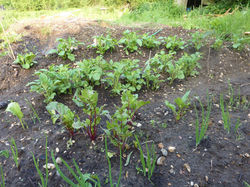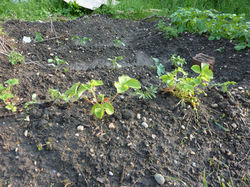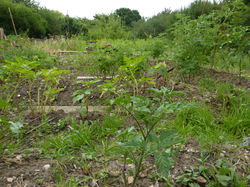
 |  |
|---|---|
![DSC_0868[1]](https://static.wixstatic.com/media/790458_3ee0bb5427a241cd8244071944a6ca9e~mv2_d_3264_2448_s_4_2.jpg/v1/fill/w_250,h_187,al_c,q_90,enc_auto/790458_3ee0bb5427a241cd8244071944a6ca9e~mv2_d_3264_2448_s_4_2.jpg) |  |
 |  |
 |  |
 |  |
 |  |
 |  |
 |
Barnet Community Garden - project summary
The ‘Barnet Community Garden’ Project has sought to widen community participation in conservation and permaculture by researching and developing environmental activities for students and volunteers in Barnet. Barnet Environment Support Team (BEST) will oversee the implementation and management of the project. A volunteer training and participation model has been established that can be delivered by students / volunteers and easily transferred to other community gardens and green spaces.
Groups of volunteers, primary/secondary school students, gardeners, job-seekers, university goers - graduates/ undergraduates and registered members of BEST will be invited to participate in the weekly practical training sessions conducted by BEST and a qualified tutor from Permaculture Gardeners Association (or other educational institution). It is envisaged that the ‘Barnet Community Garden’ Volunteer Development Programme will become self-sustaining and be operated by trained volunteers over the long term.
Project aims
-
To research, develop and deliver training programmes that will enable Barnet students / volunteers to be effectively involved in conservation projects and permaculture;
-
To encourage continued participation of Barnet volunteers in community activities through devising projects that support, educate and recognize volunteer contributions to green spaces;
-
To identify and promote leadership so that volunteers can plan, coordinate and manage the centre's activities and related conservation projects;
-
To self-empower the youth through community knowledge exchange on permaculture's principles and philosophies.
Our Mission…
To provide a platform where the whole community can positively engage with nature (not against), exchange knowledge/skills (to become self sustaining) and become self-empowered through practicing permaculture wherever they go.
Our Vision…
We aim to create a working model of an urban permaculture community garden centre which demonstrates, promotes, educates, celebrates and advocates for environmental and economic sustainability in a healthy, diverse and supportive community.
BEST has a vision to permaculture the site using ethical methods. Revegetation along the fenced perimeter and establishment of vegetable gardens with raised beds are the initial plans. Progressively orchards, kitchen gardens, market gardens, a kids area, a kitchen, an office, a workshop, a retail nursery, a green waste recycling centre, a picnic area, chicken yards, art space, native fauna/flora used for culinary and/or medicinal purposes and bird / bee houses will be established on site (based on funding).
We will collaborate with Permaculture Gardeners Association. They support members and the public with advice, support, information and training about the theory and practice of permaculture. Permaculture is a design system inspired by nature.
What is PERMACULTURE? In a nutshell..
Permaculture combines three key aspects:
1. An ethical framework
2. Understanding of how nature works, and
3. A design approach
This unique combination is then used to support the creation of sustainable, agriculturally productive, non-polluting and healthy settlements. In many places this means adapting our existing settlements. In other cases it can mean starting from scratch. Both offer interesting challenges and opportunities.
The word 'permaculture' comes from 'permanent agriculture' and 'permanent culture' - it is about living lightly on the planet, and making sure that we can sustain human activities for many generations to come, in harmony with nature. Permanence is not about everything staying the same. Its about stability, about deepening soils and cleaner water, thriving communities in self-reliant regions, biodiverse agriculture and social justice, peace and abundance.
One thing is for sure. Its a fascinating subject, with many aspects, and its still evolving.
The proposed community garden will initially run through funding from well-wishers, donations and membership fees. We plan on being self-sufficient within a few years of operation through internal commercial activities such as the garden café, sale of seedlings, sale of our own produce (from what the residents and BEST grow), conservation holidays abroad, and other related project activities.
VOLUNTEER TRAINING AT BARNET COMMUNITY GARDEN
Objectives
1. To strengthen the skills of students / volunteers and their confidence in their ability to work effectively;
2. To develop the skills of experienced volunteers who are interested in taking on the roles of coordinating other volunteers and of running volunteer induction and training programmes;
3. To clarify the roles of volunteers and volunteer coordinators;
4. To strengthen community involvement in permaculture, particularly by people who wish to become involved in organic farming and gardening for cultural and social reasons;
5. To increase students / volunteer participation in community projects;
6. To develop stronger links with other permacultarists, conservationists, ecologists, community gardens and to assist them provide training for their volunteers.
Training Programmes
Barnet Environment Support Team (BEST) has developed the following training programmes:-
An Orientation course for new volunteers that introduces them to permaculture, the community garden site and to staff and volunteer coordinators, explains the structure and functioning of BEST, outlines opportunities for volunteering and covers basic Workplace Health and Safety. These induction courses will be held three times a week (Monday, Wednesday & Friday) three weeks in a month and last for approximately 5 hours (including practical sessions volunteering before and after the training).
Volunteer Training Days that provide training in the core principles of permaculture. These will be held twice a week (Thursday, Saturday or Sunday) and run for approximately six hours.
A Volunteer Coordinator Training Programme that builds the skills and confidence of volunteer coordinators so that they can train and coordinate volunteers. This two-day programme will be held weekly, three times a month.
A Train-the-Trainer Programme for BEST volunteers, interested residents of Barnet, schools, colleges, universities and other community gardens / allotment. This programme provides practical training in small group training techniques, including training needs analysis and creative facilitation techniques. To be held twice a week depending on circumstances.
Community Training Environment
The training programmes have been developed to take full advantage of Barnet Community Garden's ‘living classroom’ of permaculture orchards, organic vegetable gardens, organic nursery, bushfood plantings, and green waste recycling centre, as well as its grass roots, community based structure and organisation.
Thus, for effective delivery, the Volunteer Training Modules in particular, require a garden environment similar to that of other established community gardens. The Volunteer Coordinator Training Programme and the Train the-Trainer Programme, however. are less site specific and can be delivered in non-garden environments.
